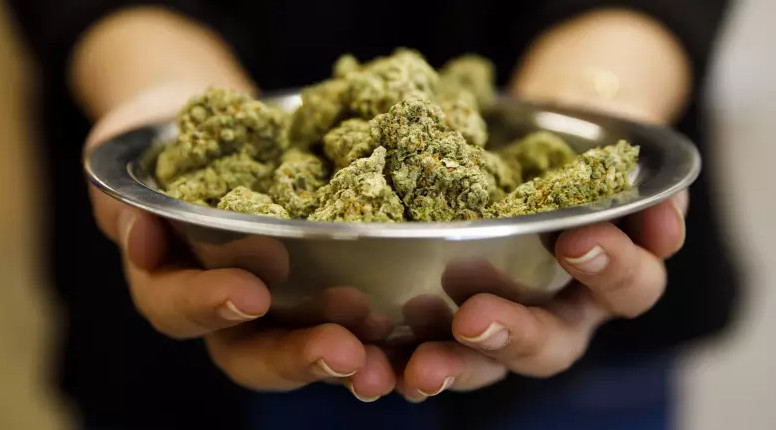DELTA TOWNSHIP — The state Board of Canvassers on Thursday set the language for the marijuana legalization proposal that will appear on the Nov. 6 ballot after some tweaks were made at the request of opponents of the measure.
The five-page proposal had to be boiled down to 100 words for the ballot and opponents wanted to make sure the language would note that, with legalization, several criminal violations would become civil infractions.
“It’s important to put in that this eliminates most criminal penalties for violators,” said Troy Cumings, of the Healthy and Productive Michigan group, which opposes the legalization.
Josh Hovey, spokesman for the Coalition to Regulate Marijuana Like Alcohol, which is spearheading the ballot proposal, said the point of legalizing weed for recreational use is getting rid of criminal penalties. So the group didn’t oppose the change in the ballot language.
“Our goal is to eliminate unnecessary arrests and stop the waste of law enforcement resources,” Hovey said. “The language says that and we look forward to communicating that to voters.”
When voters go to cast their ballots on Nov. 6, they’ll see this language:
“A proposed initiated law to authorize and legalize possession, use and cultivation of marijuana products by individuals who are at least 21 years of age and older, and commercial sales of marijuana through state-licensed retailers.”
The proposal would:
- Allow individuals 21 and older to purchase, possess and use marijuana and marijuana-infused edibles, and grow up to 12 marijuana plants for personal consumption.
- Impose a 10-ounce limit for marijuana kept at residences and require amounts over 2.5 ounces to be secured in locked containers.
- Create a state licensing system for marijuana businesses and allow municipalities to ban or restrict them.
- Permit retail sales of marijuana and edibles subject to a 10% tax, dedicated to implementation costs, clinical trials, schools, roads and municipalities where marijuana businesses are located.
- Change several current violations from crimes to civil infractions.
Opponents and some members on the state Board of Canvassers also wanted changes made that would better outline where the tax revenues from the sale of marijuana would go to clarify that the first taxes collected would go toward implementing the regulations on marijuana businesses and that any unspent dollars would then go toward schools, roads and municipalities.
“Let’s touch on reality because people still ask about where the lottery money goes,” board member Colleen Pero said. “I don’t think we can say that all of these revenues are earmarked for schools, roads and municipalities.”
If Michigan voters approve the marijuana legalization measure, the state would become the 10th in the nation and the first in the Midwest to legalize pot for recreational use. A total of 30 states, including Michigan, have legalized marijuana for medical uses.
In addition to the legal weed issue, the Board of Canvassers also approved a measure to increase access to voting for the Nov. 6 ballot.
The Promote the Vote constitutional amendment would authorize absentee voting for all voters, regardless of reason, allowing voters to register and cast ballots up to and on the same day as elections and requiring post-election audits. Currently, the cutoff for voter registration is 30 days before an election.
The proposal would also preserve the right to vote a straight-party ticket even though the U.S. Court of Appeals upheld the state law banning straight-party voting on Wednesday. Since the issue is a constitutional amendment, Todd Cook, director of the Promote the Vote campaign, said “it would trump the statute” if the ballot measure is approved by voters.
The ACLU was the primary backer of the proposal, pumping $2.2 million into the effort to gather more than 400,000 signatures to qualify for the ballot. After removing invalid signatures, the Secretary of State certified 321,755 signatures, just 6,000 more than the 315,654 needed to qualify for the ballot.
Cheryl Herrmann, an attorney who works with Color of Change, a group that promotes increasing voting in African-American communities, said her group’s participation in the Promote the Vote effort was a natural fit.
“Many of my ancestors died in order to gain access to vote,” she said. “So I found it personally a very important project to work on.”
The Board of Canvassers is expected to approve the language for the Promote the Vote ballot proposal on Friday.
Besides the marijuana legalization and Promote the Vote, voters will also get to consider an anti-gerrymandering proposal that will change the way state and federal legislative district lines are drawn.
Credit: www.freep.com




